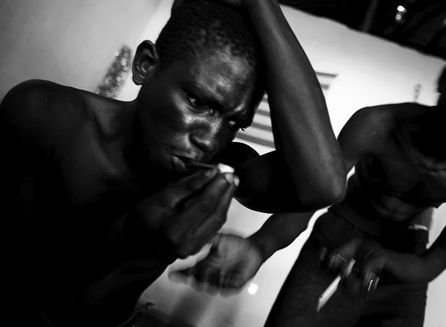Marco Vernaschi, for the Pulitzer Center
(Editor's note: This is the final dispatch in a series of eight, recounting events surrounding the double assassinations of Guinea Bissau's president and army chief of staff last March and the country's emergence as a 'narco state.')
I drive through Reno, Bissau's poorest slum, heading to Justino's house. He's 16 and a crack addict. Justino started to smoke quisa, as they call crack in Bissau, one year ago with his sister, Sadia. Now they both spend the whole day smoking the drug. Since they started, their old lives vanished. Justino lost his job and Sadia began to sell her own body. It's 10 a.m. when I park my car in front of their house. Sadia waits by the door, holding her cachimbo, the crack pipe that has become her best friend. All around the house it's garbage, rotten water and pigs.
This sounds like any other crack story, but there's a difference: We are in Guinea Bissau, a place where crack was totally unknown until traffickers decided three years ago to target this country.
Sadia's eyes are lost into the emptiness that surrounds her life. She waits for her brother to bring the drug. He comes with a friend and they immediately start smoking. I sit on the house floor with them. Sadia stretches out on a mattress while Justino and his friend feed the pipe; they start the ritual, which lasts at least 40 minutes.
They completely ignore me. They ignore everything but the cachimbo. Their entire lives revolve around the drug.
The situation in Bissau is particularly sad. There is no prevention, no rehabilitation. The issue is so new that there is no data available. It's impossible to say how many people are lost in crack addiction. And mostly, there is no consciousness among the people about the long-term effects of this plague.
I meet Sadia and her group of friends at Baiana's, at night. They are all prostitutes, all crack addicts. They spend most of the time waiting for a client to take them to a brothel. At one point a white, brand new, four-wheel-drive Toyota parks in front of the restaurant. On the doors, the Portuguese flag and the logo from the Cooperacion Portuguesa. The driver and his friend sit to drink some beers when Nadi and Tusha, two of Sadia's friends, join the men. They will leave a few minutes later, on the jeep.
Prostitution in Bissau is not for locals. Nobody can afford to pay a prostitute, and in the local culture, women cannot refuse a man. All the clients are foreigners. Sometimes sailors from anywhere, but mostly people who work for NGOs, the UN or Embassy employees. Almost every night I shared a coffee with Nadi, Tusha, Sadia, Fatima, Carolina and other prostitutes. They are somewhat proud of their work, and they see crack addiction as a minor issue. Smoking a cigarette or doing quisa – it's just the same, to them. They all dream of going to Europe – to Spain or Portugal or Italy. Nadi has a daughter who lives in Spain. She had the child with a Spanish businessman who used to travel to Bissau often: she doesn't live with her child but says she is happy all the same, for the 250 Euros per month she receives from the father. At least she has monthly revenue.
Nuno (an alias name) is a Portuguese sailor. He used to work on a ship but was forced to stay in Bissau after he fought with the captain. He asked his family to send him money to come back, but then got lost into alcohol. He's a usual client of the girls and he has AIDS. He's always drunk and spends his nights at the Baiana before heading off with two or three girls. The alarming issue is that none of the prostitutes that I met use condoms.
Since cocaine arrived in Bissau crack has spread, prostitution has increased and so has HIV-AIDS. Drug trafficking has destroyed the precarious political stability of Guinea Bissau and destroyed the lives of thousands of people. They are paying the price of Europe's voracious appetite for coke.
Reporting Sources:
United Nations Office for Drugs and Crime, Annual Report 2008 (PDF)
"Cocaine Trafficking in West Africa: The threat to stability and development (with special reference to Guinea-Bissau)," United Nations Office for Drugs and Crime, Dec. 2007. (PDF)
Drugs, Organized Crime and Terrorism as the New Threats to Global Security, by Philip de Anders, United Nations Office for Drugs and Crime, Jan. 2008. (PDF)
"Guinea-Bissau: In Need of a State," Africa Report N°142, International Crisis Group, 2 July 2008.
"Guinea-Bissau: New Hub for Cocaine Trafficking," Perspectives, United Nations Office for Drugs and Crime, 5 May 2008. (PDF)
Levitt, Matthew. Fellow at The Washington Institute for Near East Policy and director of Stein Program on Terrorism, Intelligence, and Policy.
"Organised crime, drug trafficking and terrorism: the new Achilles' heel of West Africa," Funcacion para las Relaciones Internacionales y el Dialogo Exterior. (PDF)
"2008 report of The International Control Board," Analysis of The World Situation: Africa and the Americas.
Ahukharie, Calvario. National Director of Interpol in Guinea-Bissau. Personal Interview.
Ahukharie, Lucinda Barbosa. Director of the Judiciary Police, Guinea-Bissau. Personal Interview.
